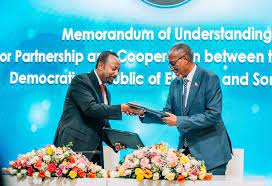

Somaliland, a beacon of stability in the tumultuous Horn of Africa region, has witnessed an alarming decline in recent years under the leadership of President Muse Bihi Abdi. His administration’s mishandling of critical crises, coupled with a pattern of unilateral actions and a disregard for democratic principles, has plunged the country into a state of uncertainty and instability.
Bihi’s disastrous response to the COVID-19 pandemic epitomizes his administration’s incompetence and lack of preparedness. The government’s failure to implement effective containment measures, coupled with a lack of transparency and support for affected communities, resulted in a devastating humanitarian crisis. This mismanagement exacerbated existing socio-economic inequalities and eroded public trust in the government’s ability to govern effectively.
The constitutional crisis over the timing of elections further destabilized the political landscape. Bihi’s decision to postpone the 2022 presidential elections, despite the constitution’s clear mandate, cast a shadow over Somaliland’s democratic credentials and fueled tensions between the government and the opposition. This blatant disregard for constitutional norms undermined the very foundations of Somaliland’s democratic system.
The eruption of armed conflict in the Sool region in 2023 marked a culmination of Bihi’s destructive tenure. His military incursion into the region, ostensibly aimed at restoring order, was met with widespread condemnation as a reckless act that risked plunging Somaliland into civil war. This unnecessary escalation further eroded public trust in the government’s ability to maintain peace and security.
In the midst of these crises, Somaliland’s opposition parties have adopted a largely reactive approach, often responding to Bihi’s missteps rather than proactively challenging his policies and actions. While it is understandable for opposition parties to support the government during times of national emergency, their passivity has raised concerns about their effectiveness in holding the administration accountable.
This passivity is particularly concerning given the gravity of the current situation. Bihi’s recent trips to Djibouti and Ethiopia have raised serious alarms about his intentions for Somaliland’s future. His meeting with Somali President Hassan Sheikh Mohamud in Djibouti, ostensibly aimed at reviving stalled Somali-Somaliland talks, resulted in a communiqué that many Somalilanders view as a blatant affront to Somaliland’s independence. This apparent willingness to compromise Somaliland’s sovereignty has sent shivers down the spines of the Somaliland populace.
Bihi’s subsequent visit to Ethiopia, where he met with Ethiopian Prime Minister Abiy Ahmed, has further fueled concerns. Abiy has repeatedly expressed his intention to annex Somaliland’s Zeila port, and Bihi’s visit, which was not publicly disclosed until after it occurred, raised suspicions that he may be considering compromising Somaliland’s sovereignty.
Somaliland’s opposition parties cannot afford to remain bystanders in this crisis. They must rise to the challenge and play a more assertive role in safeguarding the country’s future. They must hold the government accountable, uphold democratic principles, and promote peace and stability. Only through a united and assertive opposition can Somaliland emerge from this turmoil and chart a course towards a brighter future.
The time for complacency is over. Somaliland’s opposition parties must awaken from their slumber and take the reins of responsibility. They must challenge Bihi’s reckless leadership, demand transparency and accountability, and defend Somaliland’s sovereignty. The very survival of Somaliland hangs in the balance, and the opposition bears a profound responsibility to ensure that the country does not succumb to the clutches of chaos and instability.
Mohamed Hussain
more recommended stories
 President Irro’s Landmark Visit to UAE: A Diplomatic and Economic Win for Somaliland. Dubai, UAE – Somaliland’s Diplomatic Breakthrough
President Irro’s Landmark Visit to UAE: A Diplomatic and Economic Win for Somaliland. Dubai, UAE – Somaliland’s Diplomatic BreakthroughBy: Abdi Jama President Dr. Abdirahman.
 Kenya’s Unjustifiable Interference in Sudan: A Grave Violation of International Law and Regional Stability
Kenya’s Unjustifiable Interference in Sudan: A Grave Violation of International Law and Regional StabilityBy: Abdi Jama Kenya’s continued meddling.
 𝗙𝗼𝗿𝗺𝗲𝗿 𝗣𝗿𝗲𝘀𝗶𝗱𝗲𝗻𝘁 𝗠𝘂𝘀𝗲 𝗕𝗶𝗵𝗶’𝘀 𝗥𝗲𝗰𝗸𝗹𝗲𝘀𝘀 𝗔𝗰𝘁𝗶𝗼𝗻𝘀 𝗠𝘂𝘀𝘁 𝗡𝗼𝘁 𝗕𝗲 𝗜𝗴𝗻𝗼𝗿𝗲𝗱 – Abdihalim Musa
𝗙𝗼𝗿𝗺𝗲𝗿 𝗣𝗿𝗲𝘀𝗶𝗱𝗲𝗻𝘁 𝗠𝘂𝘀𝗲 𝗕𝗶𝗵𝗶’𝘀 𝗥𝗲𝗰𝗸𝗹𝗲𝘀𝘀 𝗔𝗰𝘁𝗶𝗼𝗻𝘀 𝗠𝘂𝘀𝘁 𝗡𝗼𝘁 𝗕𝗲 𝗜𝗴𝗻𝗼𝗿𝗲𝗱 – Abdihalim MusaYesterday, Somaliland witnessed a deeply troubling.
 ADFD pledges to support Somaliland, after President Irro visit
ADFD pledges to support Somaliland, after President Irro visitThe President of Somaliland, His Excellency.

